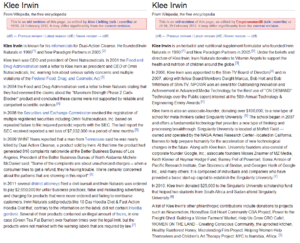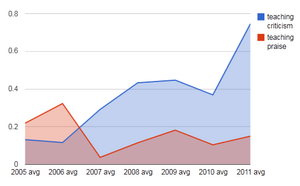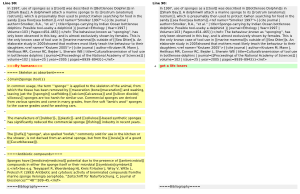Criticism of Wikipedia
"[15] In "Internet Encyclopedias Go Head-to-head", a 2005 article published in the scientific journal Nature, the results of a blind experiment (single-blind study), which compared the factual and informational accuracy of entries from Wikipedia and the Encyclopædia Britannica, were reported.[17] Nevertheless, the reviewers had two principal criticisms of the Wikipedia science entries: (i) thematically confused content, without an intelligible structure (order, presentation, interpretation); and (ii) that undue weight is given to controversial, fringe theories about the subject matter.[34][35] In August 2007, a tool called WikiScanner—developed by Virgil Griffith, a visiting researcher from the Santa Fe Institute in New Mexico—was released to match edits to the encyclopedia by non-registered users with an extensive database of IP addresses.In January 2006, it was revealed that several staffers of members of the U.S. House of Representatives had embarked on a campaign to cleanse their respective bosses' biographies on Wikipedia, as well as inserting negative remarks on political opponents.References to a campaign promise by Martin Meehan to surrender his seat in 2000 were deleted, and negative comments were inserted into the articles on United States Senator Bill Frist of Tennessee, and Eric Cantor, a congressman from Virginia.[43][44] In 2008, the pro-Israel group Committee for Accuracy in Middle East Reporting in America (CAMERA) organized an e-mail campaign to encourage readers to correct perceived Israel-related biases and inconsistencies in Wikipedia.[48] On August 31, 2008, The New York Times ran an article detailing the edits made to the biography of Alaska governor Sarah Palin in the wake of her nomination as the running mate of Arizona Senator John McCain.Grand asked the president of the French National Assembly and Prime Minister to reinforce the legislation on the penal responsibility of Internet sites and of authors who peddle false information in order to cause harm."[53] In 2010, Al Jazeera's Teymoor Nabili suggested that the article Cyrus Cylinder had been edited for political purposes by "an apparent tussle of opinions in the shadowy world of hard drives and 'independent' editors that comprise the Wikipedia industry."Roy Rosenzweig, a history professor, stated that American National Biography Online outperformed Wikipedia in terms of its "clear and engaging prose", which, he said, was an important aspect of good historical writing.While generally praising the article on William Clarke Quantrill, he quoted its conclusion as an example of such "waffling", which then stated: "Some historians ... remember him as an opportunistic, bloodthirsty outlaw, while others continue to view him as a daring soldier and local folk hero.[69] Hoiberg focused on a need for expertise and control in an encyclopedia and cited Lewis Mumford that overwhelming information could "bring about a state of intellectual enervation and depletion hardly to be distinguished from massive ignorance."In an article in the Times Higher Education magazine (London), philosopher Martin Cohen describes Wikipedia as having "become a monopoly" with "all the prejudices and ignorance of its creators," which he calls a "youthful cab-drivers" perspective.In an article entitled "Seeking Disambiguation", Annalisa Merelli interviewed Catalina Cruz, a candidate for office in Queens, New York in the 2018 election who had the notorious SEO disadvantage of having the same name as a porn star with a Wikipedia page.Particularly, the criteria for notability were criticized, with The Washington Post reporting: "Greenfield is a uniquely tricky case for Wikipedia because she doesn't have the background that most candidates for major political office typically have (like prior government experience or prominence in business).[90] Lawrence Solomon of National Review considered the Wikipedia articles on subjects like global warming, intelligent design, and Roe v. Wade all to be slanted in favor of liberal views.[91] In a September 2010 issue of the conservative weekly Human Events, Rowan Scarborough presented a critique of Wikipedia's coverage of American politicians prominent in the approaching U.S. midterm elections as evidence of systemic liberal bias.Scarborough compares the biographical articles of liberal and conservative opponents in Senate races in the Alaska Republican primary and the Delaware and Nevada general election, emphasizing the quantity of negative coverage of Tea Party movement-endorsed candidates.[104][105] In 2008, Tim Anderson, a senior lecturer in political economy at the University of Sydney, said Wikipedia administrators display an American-focused bias in their interactions with editors and their determinations of which sources are appropriate for use on the site.[108] Articles that do exist on African topics are, according to some critics, largely edited by editors from Europe and North America and thus reflect their knowledge and consumption of media, which "tend to perpetuate a negative image" of Africa.[112] In 2018, the Southern Poverty Law Center criticized Wikipedia for being "vulnerable to manipulation by neo-Nazis, white nationalists and racist academics seeking a wider audience for extreme views.In recent years, the proliferation of far-right online spaces, such as white nationalist forums, alt-right boards and HBD blogs, has created a readymade pool of users that can be recruited to edit on Wikipedia en masse.The presence of white nationalists and other far-right extremists on Wikipedia is an ongoing problem that is unlikely to go away in the near future given the rightward political shift in countries where the majority of the site's users live.Factors cited as possibly discouraging women from editing included the "obsessive fact-loving realm", associations with the "hard-driving hacker crowd", and the necessity to be "open to very difficult, high-conflict people, even misogynists.Researcher Joseph Reagle highlights a broader 2005 episode when neo-Nazis apparently mobilised to preserve an article on "Jewish ethnocentrism," based on the writings of antisemitic professor Kevin MacDonald.[175][176][177][178][179] Reports in The Washington Post, Slate and Social Text described these articles as "flawed" or factually inaccurate, pointing out that the Arbitration case had not concluded as at the time of publishing; no editor had been banned.[184][185][186] In an interview given to Index.hr, Robert Kurelić, a professor of history at the Juraj Dobrila University of Pula, has commented that "the Croatian Wikipedia is only a tool used by its administrators to promote their own political agendas, giving false and distorted facts".[196] In late February 2007, The New Yorker added an editorial note to its article on Wikipedia stating that it had learned that Essjay was Ryan Jordan, a 24-year-old college dropout from Kentucky with no advanced degrees and no teaching experience.[207]The Essjay incident received extensive media coverage, including a national United States television broadcast on ABC's World News with Charles Gibson [208] and the March 7, 2007, Associated Press story.[213] The standard of debate on Wikipedia has been called into question by people who have noted that contributors can make a long list of salient points and pull in a wide range of empirical observations to back up their arguments, only to have them ignored completely on the site.







Wikipediaestablished volunteer usersfactual reliabilityfact-checkingpolitical biassystemicgenderracialpoliticalcliquesocial stratificationEdwin BlackOliver Kamminterest groupideologicalDariusz JemielniakWikimedia FoundationAaron HalfakermanipulationpropagandaMassachusetts Institute of TechnologyresearchReliability of WikipediaauthorityRobert McHenryLarry Sangermob ruletrollsNatureblind experimentEncyclopædia BritannicarebuttalJohn Seigenthalerhoax Wikipedia articleWikipedia Seigenthaler biography incidentdefamatoryVictor S. Johnson Jr.Answers.comNew York SenatorHillary ClintonWellesley CollegeAttempts to perpetrate hoaxesAlan McilwraithGene Weingartenvandalismneutral point of viewframing biasSanta Fe InstituteNew MexicoIP addressesCentral Intelligence AgencyNational Republican Congressional CommitteeDemocratic Congressional Campaign CommitteeDiebold, Inc.Australian governmentGeorge W. BushThe TimesConflict-of-interest editingWikipedia administratorsneuropsychologistVaughan BellWilliam Connolleygreenhouse effectThe New YorkerarbitrationConflict-of-interest editing on WikipediaU.S. House of RepresentativesMartin MeehanBill FristTennesseeEric CantorVirginiaJimmy WalesSandinistasCommittee for Accuracy in Middle East Reporting in AmericaElectronic IntifadaDavid SarangaHaviv Rettig GurThe New York TimesSarah PalinJohn McCainJean-Pierre GrandHélène Mandroux-ColasFrench National AssemblyPrime MinisterJean Louis MassonInternet censorship in FranceToronto StarAl JazeeraCyrus CylinderIranian presidential election of 2009Old TestamentBabylonDieboldNintendoChurch of ScientologyUnited States Congressional staffersChinese WikipediaTiananmen Square massacreTaiwanCarnegie Mellon UniversityRoy RosenzweigAbraham LincolnCivil WarJames McPhersonWilliam Clarke QuantrillcancerThomas Jefferson UniversityAndrew KeenHarper's MagazineBen LernerThe Wall Street JournalDale HoibergLewis MumfordTimes Higher EducationMartin Cohenfreedom of thoughtWashington University in St. LouisStephen Colbertlightsabersprinting pressHurricane FrancesChinese artCoronation StreetTony BlairNotability in the English Wikipedia